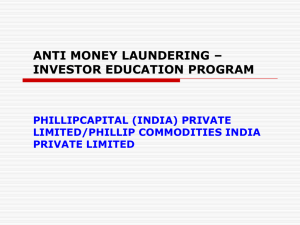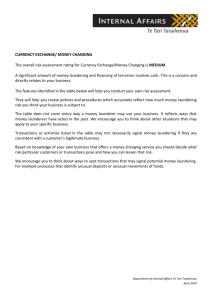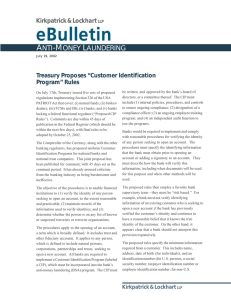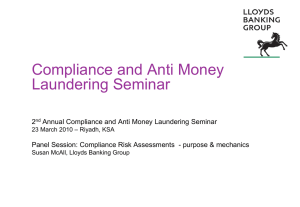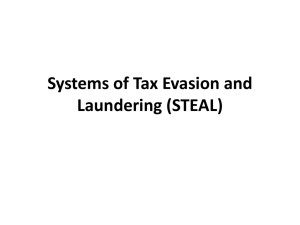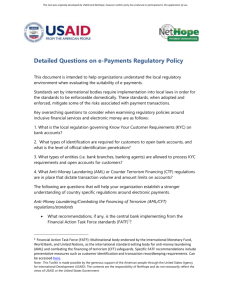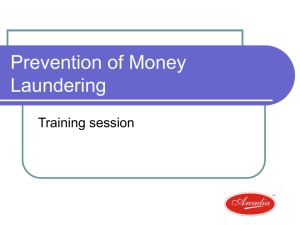A -M L NTI
advertisement
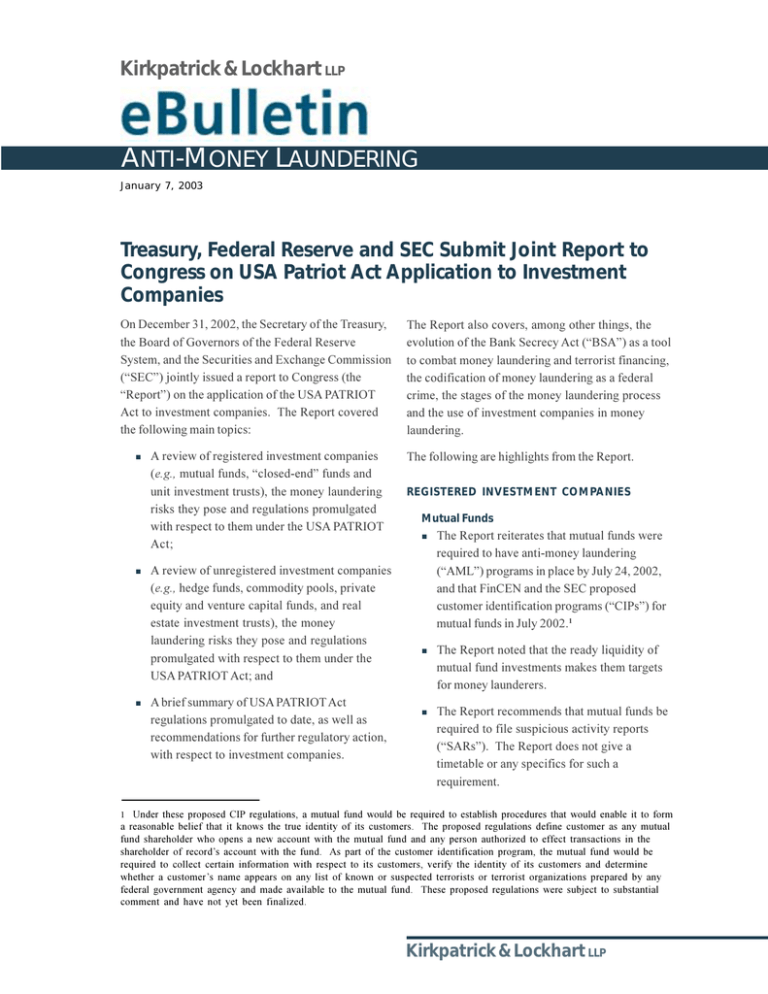
Kirkpatrick & Lockhart LLP ANTI-MONEY LAUNDERING January 7, 2003 Treasury, Federal Reserve and SEC Submit Joint Report to Congress on USA Patriot Act Application to Investment Companies On December 31, 2002, the Secretary of the Treasury, the Board of Governors of the Federal Reserve System, and the Securities and Exchange Commission (SEC) jointly issued a report to Congress (the Report) on the application of the USA PATRIOT Act to investment companies. The Report covered the following main topics: n n n A review of registered investment companies (e.g., mutual funds, closed-end funds and unit investment trusts), the money laundering risks they pose and regulations promulgated with respect to them under the USA PATRIOT Act; A review of unregistered investment companies (e.g., hedge funds, commodity pools, private equity and venture capital funds, and real estate investment trusts), the money laundering risks they pose and regulations promulgated with respect to them under the USA PATRIOT Act; and A brief summary of USA PATRIOT Act regulations promulgated to date, as well as recommendations for further regulatory action, with respect to investment companies. The Report also covers, among other things, the evolution of the Bank Secrecy Act (BSA) as a tool to combat money laundering and terrorist financing, the codification of money laundering as a federal crime, the stages of the money laundering process and the use of investment companies in money laundering. The following are highlights from the Report. REGISTERED INVESTMENT COMPANIES Mutual Funds n n n The Report reiterates that mutual funds were required to have anti-money laundering (AML) programs in place by July 24, 2002, and that FinCEN and the SEC proposed customer identification programs (CIPs) for mutual funds in July 2002.1 The Report noted that the ready liquidity of mutual fund investments makes them targets for money launderers. The Report recommends that mutual funds be required to file suspicious activity reports (SARs). The Report does not give a timetable or any specifics for such a requirement. 1 Under these proposed CIP regulations, a mutual fund would be required to establish procedures that would enable it to form a reasonable belief that it knows the true identity of its customers. The proposed regulations define customer as any mutual fund shareholder who opens a new account with the mutual fund and any person authorized to effect transactions in the shareholder of records account with the fund. As part of the customer identification program, the mutual fund would be required to collect certain information with respect to its customers, verify the identity of its customers and determine whether a customers name appears on any list of known or suspected terrorists or terrorist organizations prepared by any federal government agency and made available to the mutual fund. These proposed regulations were subject to substantial comment and have not yet been finalized. Kirkpatrick & Lockhart LLP ANTI-MONEY LAUNDERING Closed-End Funds n n n n The Report notes that closed-end funds typically are not in a position to detect and prevent money laundering because they do not have direct account relationships with investors. The Report further states that purchases and sales of closed-end fund shares are made through broker-dealers or banks, which are subject to AML regulations. The Report states that closed-end funds do not appear to present a risk of money laundering that would be effectively addressed by subjecting them to additional regulations. The Report does not recommend new regulations covering closed-end funds. Unit Investment Trusts n n n The Report states that traditional unit investment trusts (UITs) are entirely creatures of their sponsoring brokerage firms, which are already required by the BSA to establish AML programs and report suspicious transactions in connection with such entities. The Report further states that applying AML rules to traditional UITs would not appear to appreciably decrease a UITs risk of being used for money laundering. The Report also discusses UITs in the form of insurance company separate accounts. The Report notes that UIT sponsoring life insurance companies would be required to have AML programs under a rule proposed in September 2002 and that another set of AML rules applicable to the UITs would appear unlikely to increase protection against money laundering. n The Report does not recommend new regulations covering UITs. UNREGISTERED INVESTMENT COMPANIES The Report did not add significantly to the rules proposed by Treasury on September 26, 2002 (Proposed Rules), regarding AML program requirements for unregistered investment companies.2 According to the Report, the Proposed Rules were carefully designed to balance the need for a comprehensive national program to prevent money laundering against the burdens imposed by the BSA on business, including small businesses. The Report further states that the Proposed Rules redeemability requirement will likely have the effect of excluding publicly traded real estate investment trusts (REITs), a large number of special purpose financing vehicles, and many private equity and venture capital funds. Furthermore, according to the Report, the jurisdictional reach of the Proposed Rules was intended to prevent circumvention by shifting money laundering operations to an offshore fund organized in a jurisdiction without adequate AML laws. The Report states that Proposed Rules notice requirement will enable Treasury or its designee to identify unregistered investment companies subject to the rule and to monitor their compliance. The Report recommends requiring unregistered investment companies to establish CIPs, which presumably will mirror those required for other financial institutions, as discussed in footnote 1 above. The following is a brief overview of the Reports conclusions regarding money-laundering risks posed by hedge funds. The Report does not cite any specific money-laundering risks with respect to commodity pools, private equity and venture capital funds and REITS. The Proposed Rules define unregistered investment company as a company that (a) would be an investment company under the Investment Company Act of 1940 (1940 Act) but for the exclusions provided for in sections 3(c)(1) and 3(c)(7) of the 1940 Act, is a commodity pool or invests primarily in real estate and/or interests therein, (b) permits an owner to redeem its ownership interest within two years of purchase of that interest, (c) has total assets as of the end of the most recently completed calendar quarter the value of which is $1 million or more, and (d) is organized under the laws of a state or the U.S., is organized, operated or sponsored by a U.S. person, or sells ownership interests to a U.S. person. 2 Kirkpatrick & Lockhart LLP 2 ANTI-MONEY LAUNDERING AML Risks of Hedge Funds n n n According to the Report, among unregistered investment companies, hedge funds may be the most susceptible to abuse by money launderers because of the liquidity of their interests and their structure. The Report found that, when compared to other unregistered investment companies (e.g., private equity funds and REITS), the lock-up period imposed by hedge funds is relatively short. The Report also found that the structure of hedge funds makes them vulnerable to money laundering. The Report noted, for example, that the limited partner in a hedge fund could easily transfer the proceeds of a crime into a hedge fund without question as to the source of funds, absent AML compliance responsibilities. The potential availability of anonymous investments, as well as the inability of law enforcement to obtain information about beneficial ownership of corporate entities in certain jurisdictions, makes certain types of offshore funds particularly attractive to money launderers, according to the Report. The Report also noted (citing to the Report of the Presidents Working Group on Financial Markets) that a significant number of hedge funds have been established in offshore financial centers that are tax havens and may be engaged in or facilitating illegal tax avoidance and other inappropriate activities. USE OF INVESTMENT COMPANIES IN MONEY LAUNDERING The Report reviews the three stages of money laundering: placement, layering and integration, and sets forth examples of how a money launderer may use an investment company at each stage. Such examples include: n n n n n n n Use of stolen/altered checks to establish an account with an investment company; Use of money orders and travelers checks in structured amounts to avoid currency reporting by the financial institution issuing such instruments; Purchase by money launderers of an initial interest in an investment company with several wire transfers, each in an amount under $10,000 from different banks and brokerage firms; Use of investment company accounts by money launderers to layer their assets by sending and receiving money and rapidly wiring it through several accounts and multiple institutions; Redeeming an interest in an investment company originally purchased with illegal proceeds and reinvesting the proceeds received in another investment company; Use of wire transfers, checks, cash, and money orders to deposit money into an investment account, followed by withdrawals from the account on the same day or during the same week; and Purchase of an interest in an investment company in the name of a fictitious corporation or an entity designed to conceal the true owner. Please contact Diane E. Ambler (202.778.9886, dambler@kl.com) or Andras Teleki (202.778.9477, ateleki@kl.com) if you have any questions or would like further information. Kirkpatrick & Lockhart LLP 3 ANTI-MONEY LAUNDERING Kirkpatrick & Lockhart LLP offers diverse experience in issues relating to money laundering. We can help banking and diversified financial services clients assess their risk, establish and review compliance practices, investigate potential weaknesses, perform internal investigations, and respond to regulatory inquiries and enforcement actions while being sensitive to the privacy of each client and their customers through an effective attorney-client privilege relationship. In addition, we have established a website dedicated to issues relating to anti-money laundering regulatory and legislative developments. The website is located at www.kl.com/aml/amlwrc. In addition to outlining K&Ls enterprise-wide approach to assisting clients with money laundering compliance issues, the website contains a resource center with over 100 carefully selected links to various informational resources on money laundering. The resource center also includes a library of prior K&L publications on money laundering. We invite you to contact one of the members of our cross-disciplinary anti-money laundering practice team for additional assistance. You may also send general inquiries to antimoney@kl.com. BOSTON SAN FRANCISCO Michael S. Caccese D. Lloyd Macdonald Stanley V. Ragalevsky 617.261.3133 617.261.3117 617.261.9203 Eilleen M. Clavere mcaccese@kl.com lmacdonald@kl.com Jonathan D. Jaffe sragalevsky@kl.com David Mishel 415.249.1047 415.249.1023 415.249.1015 eclavere@kl.com jjaffe@kl.com dmishel@kl.com Diane E. Ambler Benjamin J. Haskin Ronald A. Holinsky Kathy Kresch Ingber Henry L. Judy Ivan B. Knauer Rebecca H. Laird Charles R. Mills Michael J. Missal Jeffrey B. Ritter Francine J. Rosenberger Robert H. Rosenblum Ira L. Tannenbaum 202.778.9886 202.778.9369 202.778.9425 202.778.9015 202.778.9032 202.778.9468 202.778.9038 202.778.9096 202.778.9302 202.778.9396 202.778.9187 202.778.9464 202.778.9350 dambler@kl.com bhaskin@kl.com rholinsky@kl.com kingber@kl.com hjudy@kl.com iknauer@kl.com rlaird@kl.com cmills@kl.com mmissal@kl.com jritter@kl.com francine.rosenberger@kl.com rrosenblum@kl.com itannenbaum@kl.com WASHINGTON, DC HARRISBURG Raymond P. Pepe 717.231.5988 rpepe@kl.com 310.552.5014 310.552.5061 310.552.5071 wbernfeld@kl.com dschack@kl.com wwade@kl.com 973.848.4014 alarocco@kl.com 212.536.4024 212.536.3941 212.536.4008 bkramer@kl.com rmarshall@kl.com lschechter@kl.com 412.355.6419 412.355.8333 hhackett@kl.com mrush@kl.com LOS ANGELES William J. Bernfeld David P. Schack William P. Wade NEWARK Anthony P. La Rocco NEW YORK Beth R. Kramer Richard D. Marshall Loren Schechter András P. Teleki 202.778.9477 ateleki@kl.com Richard L. Thornburgh 202.778.9080 rthornburgh@kl.com Robert A. Wittie 202.778.9066 rwittie@kl.com PITTSBURGH Heather Hackett Mark A. Rush ® Kirkpatrick & Lockhart LLP Challenge us.® www.kl.com BOSTON n DALLAS n HARRISBURG n LOS ANGELES n MIAMI n NEWARK n NEW YORK n PITTSBURGH n SAN FRANCISCO n WASHINGTON ......................................................................................................................................................... This publication/newsletter is for informational purposes and does not contain or convey legal advice. The information herein should not be used or relied upon in regard to any particular facts or circumstances without first consulting a lawyer. © 2002 KIRKPATRICK & LOCKHART LLP. ALL RIGHTS RESERVED.
